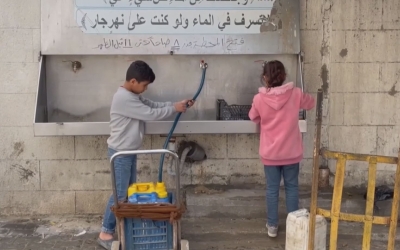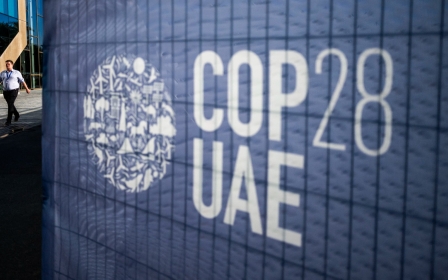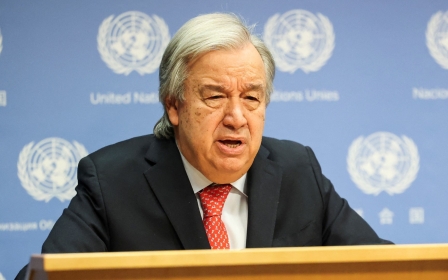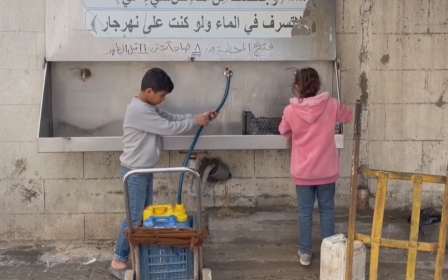Israel-Palestine war: For Palestinian environmentalists, attending Cop28 is 'illogical'
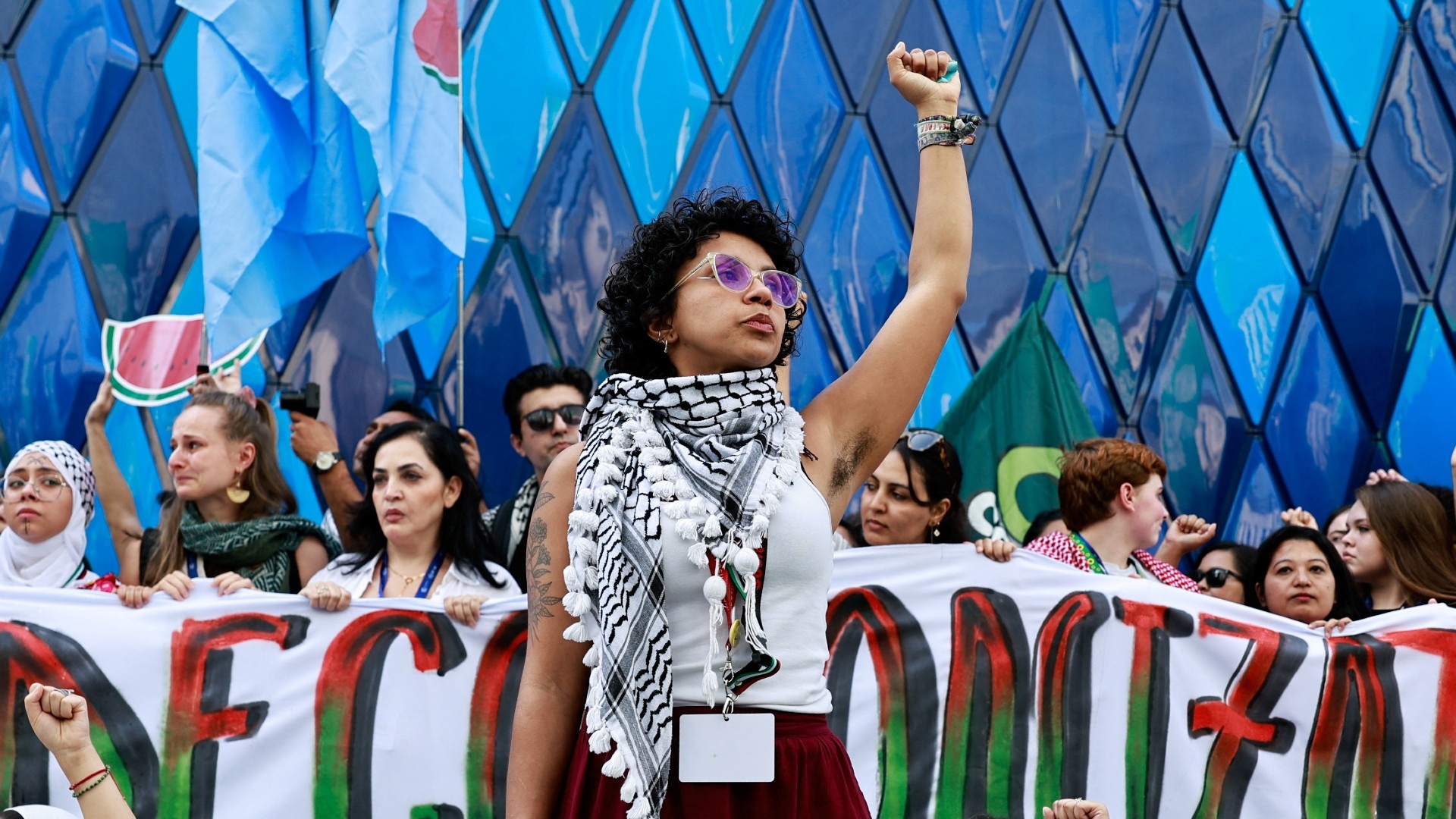
As a child, Abeer Butmeh planted her first olive tree in her family's grove near Bethlehem.
But like so many other Palestinians living in Battir village in the occupied West Bank, she remembers with painful clarity the day when that very same tree was uprooted by Israeli soldiers.
For decades, Palestinian families such as the Butmehs have been struggling to tend to their land, crops, and harvests located in "Area C" of the West Bank.
Comprising nearly 70 percent of the West Bank, the largest of three zones created by the Oslo Accords, Area C was meant to be "progressively handed back to the Palestinians".
In reality, it remains under the complete control of the Israeli army. This has meant farmers regularly need to obtain permits to access their land and tend to their trees.
New MEE newsletter: Jerusalem Dispatch
Sign up to get the latest insights and analysis on Israel-Palestine, alongside Turkey Unpacked and other MEE newsletters
This year, when the first autumn rains broke months of drought and the boughs were heavy with fruit, Butmeh's family were barred from tending to their grove.
Still, Butmeh said the act of replanting that olive tree taught her about climate activism founded on the Palestinian concept of sumud - which means steadfastness.
"When they uprooted, we replanted," Butmeh said. "It was a kind of resistance."
Follow Middle East Eye's live coverage for the latest on the Israel-Palestine war
She says the act of replanting reaffirmed her understanding that for Palestinians, the climate crisis is not a natural phenomenon, but a political one.
For Butmeh and many other Palestinian environmentalists like her, attending the UN climate summit known as Cop28, which is taking place in Dubai this week, would be "illogical" given everything that is happening in Gaza.
'How can we call for environmental justice when the world is silent regarding what is happening [in Gaza]?'
- Abeer Butmeh, Palestinian environmental activist
"How can we call for environmental justice when the world is silent regarding what is happening?" she said.
Amid Israel's devastating offensive on the besieged Gaza Strip which has killed at least 16,000 people, the Israeli government has "scaled down" its delegation at the climate summit.
Still, an array of Israeli environmental start-ups will likely showcase a plethora of green tech fixes at the summit.
"They will promote themselves as professional companies in recycling, in clean energy, and water management, and sustainable agriculture and green building," Butmeh said.
"But for the reality… come and see what is happening in Palestine."
Trees as weapons
For many environmentalists, attacks on Palestinian agriculture are part of a wider Israeli strategy for the seizure and control of Palestinian land, along with the erasure of Palestinian identity.
To this end, trees are seen as a weapon in the occupied territories.
After the Nakba - the Arabic word for "catastrophe" - which refers to the ethnic cleansing and destruction of Palestinian communities in 1948 by Zionist forces, the Jewish National Fund (JNF) planted mono-culture forests of pine trees, often on the ruins of Palestinian villages.
A 2013 report by Israel’s Society for the Protection of Nature, revealed the devastating impact of their projects on local biodiversity.
"It was a campaign of literally changing the biodiversity in Palestine," Camille Mroue, programme coordinator for the Arab Reform Initiative, told MEE.
"[Israel] realised that one of the ways they could erase the memory of Palestine… one of the ways to complement the ethnic cleansing was to commit ecocide on top of it."
JNF projects continue to decimate local flora and fauna and supplant communities, like Bedouin communities in the Naqab, who are repeatedly displaced to make way for JNF forests.
Thirst as strategy
Israel has also long weaponised water to displace and coerce Palestinian communities.
In 1954, Israel's national water carrier began diverting the Jordan River to feed Israeli citrus orchards in the Negev (Naqab) region, leaving the river desiccated and the Dead Sea depleted, producing a water crisis which a 2002 Knesset report concluded was entirely "man-made".
In June 1967, after Israel had seized control of the West Bank, including East Jerusalem, and the Gaza Strip, it consolidated its grip on all water resources and infrastructure in the occupied territories.
"In Area C, in Masafer Yatta, in South Hebron hills, or in the Jordan Valley…thirst is a strategy in order for these communities to bow down and leave," Muna Dajani, research officer at the Middle East Centre, London School of Economics and Political Science, told MEE.
'Thirst is a strategy in order for these communities to bow down and leave'
- Muna Dajani, research officer at the Middle East Centre
Research by the Pacific Institute found that Israel was one of the key drivers of a surge in water-related violence in 2022.
Amid the latest offensive on Gaza, Israel's decision to sever water and electricity to the besieged enclave, and the repeated targeting of water desalination plants, has been blamed for exacerbating the existing water crisis.
But Israeli control over Palestinians’ access to water is also implemented by more covert means.
While Palestinians must apply for permits to construct pipelines, Israel's national water company, Mekorot, has sunk wells and tapped springs to pump unlimited supplies of water to Jewish settlements, and sell it back to the Palestinian population for extortionate sums, according to rights groups such as Amnesty International.
Even access to rainwater is policed, with rainwater harvesting banned throughout the West Bank.
The result, according to rights groups such as B'Tselem, is "water apartheid," with Israelis consuming three times the amount consumed by West Bank Palestinians.
Israel has pushed back against such claims, arguing that it is a "water scarcity" issue and that it has a plethora of tech fixes, such as a five-year scheme by the Green Climate Fund to reuse wastewater for sustainable agriculture.
"Without the occupation, we have enough water to serve Palestinian communities, but with Israeli occupation, we suffer from water shortages," Butmeh said.
A performative climate diplomacy
Weeks of Israeli air strikes on the besieged Gaza Strip have also cast a long shadow on the climate talks.
Despite the Palestinian Authority erecting its first pavilion at the talks, only 10 Palestinian delegates were at the start of the conference.
"We are here all together, all the world together, to combat climate change and really, we're negotiating for what?" said Hadeel Ikhmais, a climate change expert with the Palestinian Authority.
"We're negotiating for what in the middle of a genocide?"
But the silence was broken by a pro-Palestine rally that erupted at the conference on Sunday in the first-ever Palestine protest in the UAE.
Banned from raising the Palestinian flag, activists held watermelons aloft instead and chanted "no climate justice without human rights".
According to activists, Cop has long provided a platform for Israel's greenwashing strategy, but since the signing of the US-brokered Abraham Accords, it has become a space to pursue its normalisation efforts under the guise of energy security.
Under the deal, signed between the UAE, Bahrain, Morocco, and later Sudan, Israel and the normalising Arab states signed a slew of memoranda of understanding (MOUs) for implementing agribusiness, water and renewable energy projects.
The Palestinian think tank Al-Shabaka has called these projects a form of "eco-normalisation” which plays a pivotal role in Israel's efforts to greenwash its oppression of Palestinians.
For Dajani, who has documented the struggles for land and water by the Jawlani community in the occupied Golan Heights, the climate diplomacy at Cop28 is merely "performative" and distinct from the everyday acts of environmental struggle practised by Palestinians.
"There is a kind of underground, community-led adaptation that people do on a daily basis," Dajani told MEE. "And that is far more radical than what is on the table in Cop."
"We have always found ways to resist... there is now a strong movement of activists who are pushing to disengage from dependency on Israel... [and] to bring traditional knowledge back into practice by Palestinian farmers and Palestinian shepherds and elsewhere," he said.
"It can be something as small as collecting rainwater, but can be also more visible and larger-scale infrastructure," Dajani said, "but that's part of its strength, that, you know, people can do it here and there."
Middle East Eye delivers independent and unrivalled coverage and analysis of the Middle East, North Africa and beyond. To learn more about republishing this content and the associated fees, please fill out this form. More about MEE can be found here.


